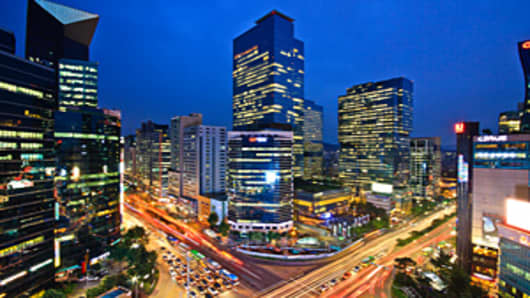South Korea's new government unveiled 5.3 trillion won ($4.7 billion) in stimulus spending plans on Tuesday to generate jobs, support small business and bolster property prices hit by slow economic growth as well as fierce competitive pressure from the sliding yen.
The government of President Park Geun-hye, sworn in less than two months ago, said in a statement that fresh stimulus spending would help lift this year's economic growth to 2.6 percent or higher from around 2.3 percent seen otherwise.
The stimulus spending plans are part of a 17.3 trillion won extra budget bill that the cabinet is due to send to parliament this week for approval, with 12 trillion won to make up for a budget shortfall because of lower than forecast revenue.
(Read More: South Korea Top Exporters Already Hit by Weak Yen)
"I believe that, in conjunction with other policies like the property market measures announced earlier, an extra budget of this magnitude will be enough to kindle hopes for an economic recovery," Finance Minister Hyun Oh-seok told reporters at an embargoed briefing held last week.
North Korea's threats of a nuclear war and the Japanese Prime Minister Shinzo Abe's massive monetary easing drive to end deflation both have recently emerged as fresh risks to South Korea's export-reliant economy.
(Read More: North Korea Says Retaliations to 'Start Immediately')
But the relatively small stimulus plan -- 0.4 percent of annual gross domestic product -- contrasts with Japan's massive stimulus policies and reflects a different, milder set of risks facing South Korea than those facing its bigger neighbor.
South Korea's economy has been growing for 15 successive years, inflation is a bigger risk than deflation, its currency is largely seen as undervalued and its household savings need to be raised after years of over-spending.
The supplementary budget bill has been drawn up because Park's government sharply downgraded this year's economic growth projection from that of the previous government, which saw Asia's fourth-largest economy growing by 3 percent this year.
Public funds will boost their spending by 2 trillion won this year to help support the economy. These stimulus plans, along with property market-boosting measures announced earlier, would lift this year's economic growth by 30 basis points (0.3 percent) and next year's by 40 basis points, the ministry said.
(Read More: South Korea Won at Fresh 7-Month Low Amid North Korea Risk, Bonds Rise)
The government now plans to sell an net additional 8.8 trillion won worth of bonds this year to fund the extra budget. It will spread out the increase in debt sales to avoid a spike in supply in certain months or specific tenors.
The government now expects this year's fiscal deficit to reach 1.8 percent of annual GDP, compared with a 0.3 percent deficit seen previously and a 1.4 percent deficit posted last year, the ministry said.
(Read More: South Korea Q4 GDP Growth Revised Down to 0.3%)
Underscoring a relatively milder set of risks facing South Korea's economy, the country's central bank last week kept its policy interest rate unchanged at 2.75 percent for a sixth consecutive month.


